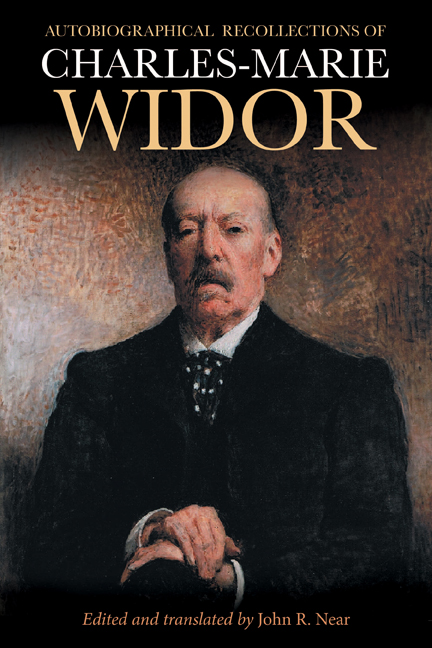Book contents
- Frontmatter
- Contents
- List of Illustrations
- Foreword
- Preface
- Acknowledgments
- Introduction: Tribute to Charles-Marie Widor
- Part One Studies, Early Performances, and Aristide Cavaillé-Coll (1844–69)
- Part Two La Belle Époque: The Franco-Prussian War to The Great War (1870–1914)
- Part Three The Great War and Important Initiatives (1914–37)
- Appendix 1 Birth record of Charles-Marie Widor, 1844
- Appendix 2 Widor’s Diplôme de Bachelier ès Lettres, 1863
- Appendix 3 Widor’s letter of appreciation to Jacques Lemmens, 1863
- Appendix 4 Brussels Ducal Palace organ specification, 1861
- Appendix 5 Widor’s certificate for Chevalier de l’Ordre du Christ, 1866
- Appendix 6 “To Budapest,” 1893
- Appendix 7 Widor’s travels to Russia and his 1903 passport
- Appendix 8 Widor’s list of his works in 1894
- Appendix 9 The Paris Conservatory organs, 1872
- Appendix 10 Chronique [Widor’s appeal for an organ hall at the Paris Conservatory, 1895]
- Appendix 11 Widor’s certificate for the Académie Royale, Brussels, 1908
- Appendix 12 “Debussy & Rodin,” 1927
- Appendix 13 The American Conservatory organ, Fontainebleau, 1925
- Appendix 14 Letters concerning the Trocadéro organ restoration, 1926
- Notes
- Bibliography
- Index
- Eastman Studies in Music
Foreword
Published online by Cambridge University Press: 09 May 2024
- Frontmatter
- Contents
- List of Illustrations
- Foreword
- Preface
- Acknowledgments
- Introduction: Tribute to Charles-Marie Widor
- Part One Studies, Early Performances, and Aristide Cavaillé-Coll (1844–69)
- Part Two La Belle Époque: The Franco-Prussian War to The Great War (1870–1914)
- Part Three The Great War and Important Initiatives (1914–37)
- Appendix 1 Birth record of Charles-Marie Widor, 1844
- Appendix 2 Widor’s Diplôme de Bachelier ès Lettres, 1863
- Appendix 3 Widor’s letter of appreciation to Jacques Lemmens, 1863
- Appendix 4 Brussels Ducal Palace organ specification, 1861
- Appendix 5 Widor’s certificate for Chevalier de l’Ordre du Christ, 1866
- Appendix 6 “To Budapest,” 1893
- Appendix 7 Widor’s travels to Russia and his 1903 passport
- Appendix 8 Widor’s list of his works in 1894
- Appendix 9 The Paris Conservatory organs, 1872
- Appendix 10 Chronique [Widor’s appeal for an organ hall at the Paris Conservatory, 1895]
- Appendix 11 Widor’s certificate for the Académie Royale, Brussels, 1908
- Appendix 12 “Debussy & Rodin,” 1927
- Appendix 13 The American Conservatory organ, Fontainebleau, 1925
- Appendix 14 Letters concerning the Trocadéro organ restoration, 1926
- Notes
- Bibliography
- Index
- Eastman Studies in Music
Summary
There is hardly an organist who is not familiar with the name of Charles- Marie Widor, if only from having heard or played his famous Toccata. But, in fact, Widor was more than a composer of organ music. He was certainly one of the more prolific composers of the second half of the nineteenth century and the first part of the twentieth, and his output is astounding, even in comparison with his contemporaries. Dozens of collections of piano music, chamber works, sacred music—both choral and solo voice, songs and vocal duets, five orchestral suites, five orchestral symphonies—including two with organ, four concertos, a ballet, lyric dramas, operas, a symphonic poem, and other sundry pieces, all added to the ten symphonies for organ, make an astonishing list of works. Then there were his literary works, which in John Near's biography cover four and one-half pages.
Perhaps more than anything these Autobiographical Recollections demonstrate Widor's broad interests, catholicity of taste, and the international social milieu in which he moved. It is remarkable how little these valedictory recollections mention the organ. Rather, they are memories of his life beyond the organ loft.
What began as a hodge-podge of reminiscences by a ninety-two-year-old narrator, taken down by dictation on several occasions, has been assembled by John Near into a seamless autobiography. But appreciating that readers, particularly English-speaking readers, would be unfamiliar with the people and events scattered throughout the text, he has researched and identified hundreds of names, as well as provided the historical background of the world in which Widor lived. Realizing the likely historic importance of his narrative, Widor frequently advised his amanuensis to look up a date or fact, and this Dr. Near has done almost a century later.
Widor was indeed the last of the Romantics. Many remembered and had known Franck, Saint-Saëns, and Fauré, but almost none had met or known Liszt, Rubinstein, and Wagner, much less fought in the Franco-Prussian War. His influence at the Conservatory and at the Académie des Beaux-Arts was far-reaching in France's musical culture.
John Near's lifelong research has produced the award-winning biography, Widor: A Life beyond the Toccata, the definitive edition of Widor's ten organ symphonies, the first edition of his Symphonie, op. 42[bis], and a critical edition of Bach's Memento. This previously unpublished autobiography gives us Widor the man in his own words.
- Type
- Chapter
- Information
- Autobiographical Recollections of Charles-Marie Widor , pp. xiii - xivPublisher: Boydell & BrewerPrint publication year: 2024

